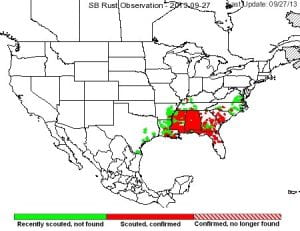Nathan Kleczewski, Extension Specialist – Plant Pathology; nkleczew@udel.edu
SBR continues to develop and spread in the surrounding areas, with an additional report of the disease in Isle of Wight County, Virginia and a field of double-cropped soybeans nearing the R6 growth stage in Caldwell County, Kentucky. Kentucky is the 11th state to report SBR. Other reports have come in from North Carolina and Mississippi, among others. In 2013, SBR has been detected in 213 counties in 11 states in the U.S. including 65 counties in AL, 53 counties in MS, 40 counties in GA, 22 counties in FL, 13 counties in SC, 11 parishes in LA, three counties in NC, two counties in AR and VA, and one county in both TN and KY. SBR was also reported in two municipalities in Puerto Rico.
The current status of Soybean Rust in the United States as of September 27, 2013.
We are currently monitoring all counties for SBR and have not detected any signs of the pathogen in the area. Monitoring of the pathogen will continue until double crop beans are at R6, which should be right around the corner for many fields. Unlike Virginia, which has been warm and wet, Delaware has been rather dry and cool, which is not conducive to disease development. However, we never know what the future may hold in terms of weather. Just a reminder, fungicide sprays are most useful if the risk for disease is moderate (i.e. we find it within 100 miles of Delaware) to high (we find it in a Delaware field), beans are at a growth stage earlier than R6, and the weather is favorable for disease development. There are several fungicides labeled for SBR, although remember that a greening effect may occur if a product containing a group 11 fungicide is utilized. In addition, late planted beans may be at risk for frost. Sprays are not recommended at the current time. Fields should continue to be scouted for SBR through R6 as a precaution. Suspect leaves can be sent to the University of Delaware Plant Diagnostic clinic or to your local Extension office. For updates on SBR, go to http://sbr.ipmpipe.org/cgi-bin/sbr/public.cgi. I will continue to add commentary under the Delaware section on the ipmPIPE website, and any future updates on the progress of SBR will be posted on the Field Crops Disease Management Blog.
This year has been an interesting introduction to Delaware agriculture, to say the least. I hope to meet many more of you at various conferences and meetings during the winter, and I can be easily reached by phone or email. Feel free to call or write with any questions or concerns you have regarding field crops disease management. I will be populating the Field Crops Disease website for the University of Delaware during the winter and will continue to post to the Field Crops Disease Management Blog.

